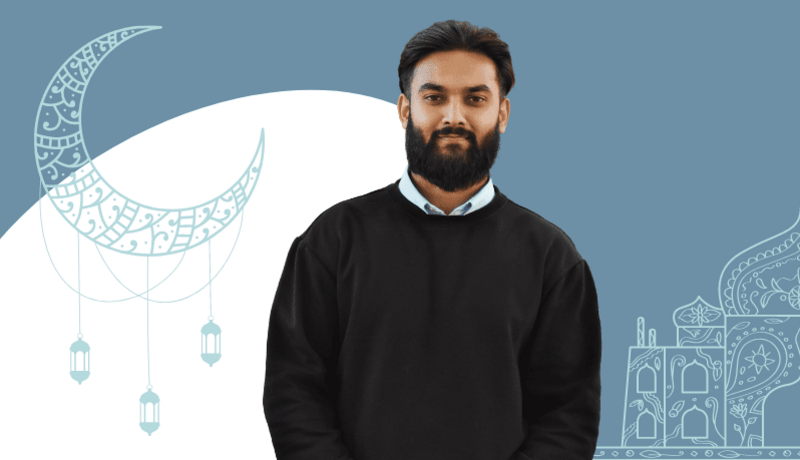Personal Perspectives | Ramadan with Oman Azad
Posted on April 2022

Ramadan is a sacred month in the lunar calendar where Muslims commit themselves to prayer and fasting, and is one of the five pillars of Islam. Oman Azad from our Bristol office shares with us his experience of the month and the significance it holds for him.
What happens during a day in Ramadan?
Each day you wake up an hour and a half before sunrise to have food, and the fast starts once you pray Fajr, the first of the day. The fast takes place from that moment until sunset. You can’t eat, you can’t drink, but it’s more than just food, your whole body is under a fast; anything that’s negative or frowned upon, you don’t do. Then you go about your day as normal!
Once you reach sunset, you pray the prayer called Maghrib, and you eat and pray together as a family. Throughout the day, we’ll try to read as much of the Qur’an as we can; a lot of people like to read it all over the course of Ramadan to feel closer to God. At the end of the final prayer (Ishaa) we go to the Mosque to pray Tarawih where hundreds of Muslims gather together and pray; this happens every night of Ramadan.
What significance does Ramadan hold for you?
For me, Ramadan is about appreciation, self-reflection and community service. There are millions of people around the world who don’t have the luxuries I do; knowing I can have a glass of water or can eat the foods I like whenever I want, Ramadan is a reminder to not take these things for granted. Not only food, but I also appreciate being able to see my family every day, as I know there are a lot of people who don’t get to speak to their families very often. Ramadan makes you feel privileged for what you have in your life, which also inspires you to help others; Muslims are required to give to charity – it’s also one of the five pillars of Islam – and people are particularly generous during this month.
It's also important to recognise Ramadan isn’t just about the outward observances, it’s more of a spiritual matter. I believe the Qur’an is the way of life, and so if it’s telling me to pray or fast for a particular month, I am going to do it. The things we do during Ramadan – giving to charity, being careful what we say, reconnecting with and forgiving others – we should be doing every day, but this month helps me to recommit to my priorities, get rid of bad habits, and hopefully become a better person.
How can we support our Muslim colleagues during Ramadan?
A lot of people might think they can’t eat or drink around us, but I promise you it doesn’t affect us; I will not be offended if you eat in front of me while I’m fasting. There might be times where we need to pray during work, and we can’t speak to others because our focus goes to the prayer. So if you see someone has gone into a room to pray, please don’t interrupt them or try to speak to them. At the same time, I’d like to say to my Muslim colleagues – if you’re going into a room to pray, remember to leave a note on the door, otherwise people may not be aware!
What are your highlights of the month?
I particularly enjoy Tarawih; praying with fellow Muslims makes it feel like you really are a part of something. The Qur’an teaches us what to say during prayer, and towards the end we can pray about personal matters too: health and wellbeing, people around us, and others in the world that need help. I like to be able to stand next to my friends and pray for a good hour and a half together. We’re a lot more connected as a community during Ramadan than we usually are; we see a lot of people we haven’t seen in years. There’s just a lot of joy and fun in that month that you don’t experience in the other eleven.
Ramadan Mubarak to everyone celebrating. We hope it is a month full of joy and time spent with friends and family.
Recent Articles
-
Flipping the Script on Islamophobia | Personal perspective | Nadia Muzaffar
Conversation is a powerful tool. Even a two-minute chat can change a perception, correct a misco...
24 days ago -
Pancreatic Cancer Awareness Month | Personal Perspective | Louise Francis
This year, our Birmingham office chose to fundraise for Pancreatic Cancer UK in support of my br...
about 1 month ago -
Personal Perspective| Islamophobia Awareness Month with Safiyyah Ayaz
For Islamophobia Awareness Month, we are honoured to feature passionate employees who have chosen...
about 1 month ago